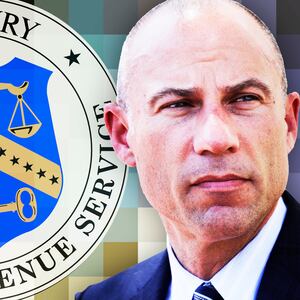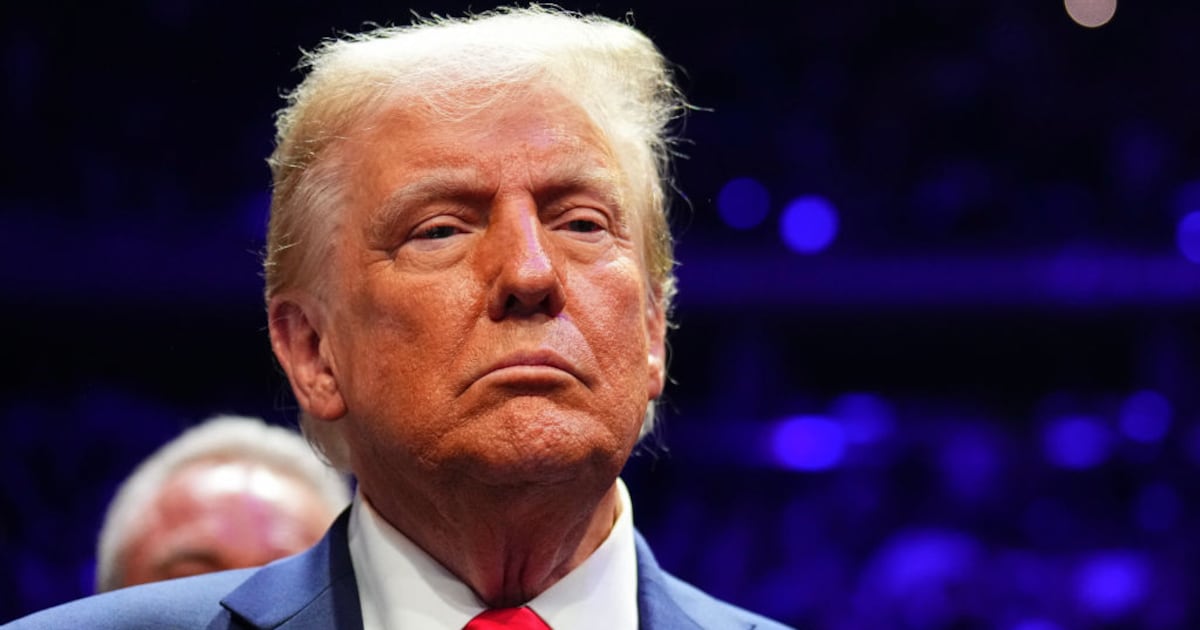Embattled lawyer Michael Avenatti, who is accused of trying to extort Nike for more than $20 million, will face trial in Manhattan federal court next week—despite his lawyers’ efforts to delay the criminal proceedings further.
During a hearing on Wednesday, prosecutors and defense lawyers argued over what evidence of Avenatti’s debts, including millions in judgments and tax warrants, was admissible. They also sparred over the defense’s plans to mention adult-film actress Stormy Daniels during opening arguments. Avenatti catapulted to fame in 2018 after representing Daniels in her legal tangles with President Trump and his fixer, Michael Cohen. He even fancied himself a Democratic presidential candidate who would defeat Trump.
But prosecutors said they wanted to keep Stormy’s name (and President Trump’s) out of opening remarks, which could begin late Tuesday or Wednesday of next week.
ADVERTISEMENT
“This case has nothing to do with politics in any way, shape or form,” said assistant U.S. Attorney Daniel Richenthal, adding prosecutors were concerned about the “injection of politics” into the extortion case. Richenthal said that Trump and Daniels “evoke strong emotions and feelings,” and expressed concerns that Avenatti’s team would suggest the prosecution was politically motivated by Trump. He also argued Avenatti’s lawyers should not describe the 48-year-old lawyer as a fighter for “justice.”
U.S. District Judge Paul Gardephe said “nothing would please me more” than to keep Trump and Daniels out of the case, but “I can’t pretend there was an immaculate conception” that led to Avenatti’s overnight fame.
“It’s necessary background and part of the story,” Gardephe added. “His public persona is inextricably entwined with his representation of Daniels.” Gardephe assured the courtroom he wouldn’t allow the criminal trial to become an exploration of the Daniels controversy.
Avenatti was hauled into the courtroom without handcuffs, wearing navy-blue prison garb and orange shoes. The brash litigator seemed unfazed during the nearly five-hour hearing, whispering and writing notes to his legal team. Later on in the proceeding, Avenatti even appeared to smile when his lawyer, Howard Srebnick, read aloud headlines from CNN’s website about Daniels’ legal battle with Trump.
The extortion charges stem from Avenatti’s representation of Gary Franklin, a youth basketball coach in Los Angeles, who claimed Nike employees were secretly funneling payouts to high-school basketball players and their families. Prosecutors say Avenatti illegally demanded Nike pay his client $1.5 million in exchange for keeping silent on the allegations. He also demanded the shoe corporation hire him, and celebrity lawyer Mark Geragos, to conduct an “internal investigation” for Nike for up to $25 million.
Prosecutors said Avenatti’s lawyers shouldn’t be permitted to delve into the porn star’s politically charged case at length during opening remarks. But the defense says Franklin hired Avenatti because of his attention-grabbing tactics on behalf of Daniels; they plan to present text messages between Franklin and Jeffrey Auerbach, an entertainment industry executive who connected him to Avenatti, indicating they were impressed by Avenatti’s approach.
Stormy Daniels wasn’t the only boldfaced name mentioned in court on Wednesday. The defense also tried to drag the name of prominent lawyer David Boies and his firm, Boies Schiller Flexner, which represents Nike, into Avenatti’s criminal case.
Srebnick said his opening argument would also highlight how Avenatti and Geragos had doubts about the ability of Boies Schiller Flexner to conduct an independent investigation into Franklin’s claims that Nike paid high-school players. The lawyer said he planned to cite a New York Times report on Boies’ alleged “conflicts of interest” with other companies.
In response, Gardephe balked, saying, “Why do we care about David Boies? He wasn’t involved in the discussions your client had…”
The prosecution was also concerned about Avenatti’s lawyers mentioning Geragos’ client, NFL quarterback Colin Kaepernick, to the jury. (Geragos brokered Kaeperick’s “Just Do It” ad campaign with Nike, and that’s why Avenatti enlisted him in Franklin’s case, prosecutors say.) Richenthal argued Kaepernick could also evoke feelings in jurors. Gardephe agreed, saying the defense’s injection of the athlete’s name might have an “untoward” effect on the jury, and advised Srebnick to refer to Kaepernick only as a prominent football player.
Meanwhile, Avenatti’s lawyers asked Gardephe to postpone the case for another week because of his confinement at Metropolitan Correctional Center (MCC), the federal lockup that housed Mexican drug kingpin “El Chapo” and sex offender Jeffrey Epstein. Indeed, Avenatti’s counsel claims he’s occupying the drug lord’s former cell.
As The Daily Beast previously reported, the feds arrested Avenatti on Jan. 14 for allegedly violating the conditions of his bail in a separate California federal case. The arrest took place during Avenatti’s disciplinary hearing with the California state bar, which was paving the way to disbar him for allegedly bilking a paraplegic client out of $840,000.
Scott Srebnick, another lawyer for Avenatti, said the MCC processing took days and that Avenatti still needs to review evidence, including financial documents. But Gardephe replied that much of the evidence has been available to Avenatti “for many months” and declined to reschedule the trial, which is expected to last 2.5 weeks.
Solitary confinement has affected Avenatti’s “mental state and ability to work with us,” Scott Srebnick told the court. He asked Gardephe to get the Bureau of Prisons to move Avenatti to a “less onerous, less confining” cell in the prison’s general population.
Gardephe said U.S. Marshals “moved Heaven and Earth” to get Avenatti to New York, and that he was reluctant to become involved with MCC’s security issues. Gardephe said he would intervene later if the prison was “interfering with the defendant’s right to a fair trial.”
As part of the hearing, Gardephe also said Avenatti’s trial can’t devolve into a lengthy analysis of his financial condition. Gardephe ruled that he’ll allow the government to present unpaid debts including multi-million dollar judgments in California, unpaid child and spousal support, and tax warrants.
Gardephe also ruled that he wouldn’t allow testimony from Avenatti’s office manager, who, according to prosecutors, estimated Avenatti’s debts to total $20 million to $25 million. The government has previously stated Avenatti’s debts totaled about $15 million and were a motive for the alleged extortion plot. (Avenatti denies both claims.)
In a Jan. 15 letter to Gardephe, the U.S. Attorney’s Office claims that between March 15 and March 25 of 2019—about the same time frame as the alleged extortion scheme—Avenatti called his office manager and said “he was about to receive enough money to pay off his debts.” Avenatti “sounded enthusiastic and excited” on the phone call “and indicated that, after receiving that money, he would be able to live his life the way he wanted to,” the letter states.
In response, Avenatti's team argued the office manager’s testimony should be excluded. In a letter of their own, they said the figures were “seemingly plucked from the air... and the government provides no basis” for the employee’s figures.






